Family Dinners on Film + Autumn's Obligations
Eat Drink Man Woman + Gilmore Girls, A Suggested Pairing
With September comes a sense of duty. Whether you’re off to school, sending your children to school, hunkering down at work, or hunkering down to write your newsletter (pay no attention to the woman behind the curtain), September is a month that forces us to refocus on our obligations and our routines.
At some point in your life, you may have been obliged to sit at a dinner table with your immediate family on a regular basis. Perhaps you were a child, forced to stay at the table until the broccoli on your plate disappeared. Perhaps you were an adult, connecting with your elders or enforcing mandatory dining rules yourself.
In any case, you’ve likely experienced family using food and family dinners as a vehicle for talking about something else entirely. Just as food can be a metaphor for something great in film and media, it is often an intermediary in our real-life conversations.
Can you recall a time when a family member was late to dinner, and everyone ragged on them? Your family may have felt this tardy person was generally disrespectful, too focused on work, or any myriad of issues. Yet, instead of voicing their true concerns, your family simply focuses on the matter at hand: The family dinner is getting cold.
Above, food gets cold in an episode of Gilmore Girls (discussed later in this post.)
Obligatory time with family around the dinner table can turn out to be “quality time,” no doubt. But it also can be a time of conflict. In the latter instances, family dinners still serve a purpose: a time for communication, even if it’s not all positive.
It is unsurprising, then, that so many films and television shows — art that entertains with conflict — feature scenes around standing family dinners. Today, I’d like to discuss a prime example of this phenomenon in Director Ang Lee’s Eat Drink Man Woman.
Eat Drink Man Woman (1994) + Sunday Night Feasts
The film centers around the best chef in Taipei, Zhu, and his three daughters, all in their 20s yet still living in the family home. Often, they gather as a family for elaborate Sunday feasts.
While most of us would be salivating at the thought of a well-cooked traditional Chinese meal, the family often uses these dinners as occasions for important life announcements. Consequently, the daughters often expend more energy being fearful of their family’s judgment than enjoying the delicious food. Their master chef of a father is also losing his sense of taste, exasperating the patriarch just as his family life begins to take on new flavors.
Eat Drink Man Woman opens with Zhu preparing the Sunday dinner. Between chasing after live chickens in the yard and carefully hand-shaping dumplings, Zhu stops to pick up the phone and walk someone else through how to cook a fish. It is only at the end of the film that we understand who was likely on the other end of the line.
Above, the opening cooking scene of Eat Drink Man Woman.
The film’s title couldn’t be more straightforward: This is a movie about relationships between men and women, and eating and drinking are the language the characters speak.
More to the point, each of the four biggest plot points in the film come in the form of family members making dramatic announcements at their family Sunday dinners. I won’t give them away, but each declaration consists of big life updates. Dinner, it seems, is the only time and place the family feels comfortable speaking to one another. “We communicate by eating,” one daughter notes.
Logistically, Ang Lee admitted the behind-the-scenes ordeal of keeping the food steaming and fresh for the camera was “killer.” A food consultant (what a gig!) and three master chefs were hired to “plan and prepare more than 100 recipes used in the film,” the NY Times reported upon the film’s release. The level of care given to the opening scene alone went down in the food-in-film history (Eat Drink’s influence is abundantly clear in this year’s recent epicure film by Tran Anh Hung, The Taste of Things.)
I recently watched Eat Drink Man Woman film for the first time and, admittedly, I found the climactic plot twist to be quite jarring. Then again, I find other films by Ang Lee — e.g. Life of Pi — to share a distinct, unceremonious tonal whiplash in their final acts. Just when I think I’m watching one film, the rug is quietly pulled out from underneath me, revealing what the story was all along. It’s rare to encounter this flavor of “gotcha-cinema” outside of your typical genre film. While I don’t always love the aftertaste, I do revere it.
Beyond mysteries, thrillers, and horror films, I do appreciate a good old rug-pulling — training of the audience to expect the unexpected — in comedy. After watching Eat Drink Man Woman, I could think of no better comedy to refresh my palette than the television show Gilmore Girls and its weekly Friday Night Dinners.
Gilmore Girls (2000-2007) + Friday Night Dinner
For the uninitiated, this series centers around the relationship between three generations of the Gilmore family. The grandparents, Emily and Richard, are proud members of upper-class society in Connecticut, often placing outsized value on money and appearances. Their daughter — Lorelai, the show’s hero — became a teen mom at age 16, and has had a strained relationship with her parents ever since. And finally, Lorelai’s daughter Rory, a bright young student with big ambitions.
The show begins when Lorelai needs help paying for Rory’s private school tuition. She reluctantly borrows the money from her parents, but one condition is set: All three generations must meet for dinner every Friday night.
The architect behind the family dinner obligation is Emily, a grandmother who desperately wants to have closer relationships with her daughter and granddaughter. The entire seven-season series (and its 2016 Netflix “check in” mini-series) explores their relationships via these weekly dinners.
The forced nature of Gilmore Girls’ Friday night dinners is reflected in the art direction: No need to make the food appear piping hot. Instead, the food always appears just as buttoned up as the grandparents: Well plated, traditional, and conservatively warm. Never anything too decadent. Lots of oven roasted potatoes.
Still, the conversation somehow ends up focusing on the food. (Think: “How is the soup?,” or “What do you think of this new wine we picked up France?”) For a show known for its quick wit and fast conversational pace, even the most mundane of food conversation starters are attacked with fervor. Despite any reluctant feelings you may have based on the title, this show is one any food-on-film lover can satisfyingly sink their teeth into.
Above, the Gilmore family tries marzipan.
An Autumn Dinner Pairing
When jumping into your fall routines, you may be tempted to meal prep a menu of limp salad lunches and chicken a la steamed broccoli every night for dinner
If you, too, have a newfound desire to create healthy habits, more power to you. Personally, while I do eat quite healthy, if I eat a zero-carb salad every day for a week, I’m two seconds away from being institutionalized… or at least dropping too much money on unhealthy takeout.
I’m certainly no doctor, but might I suggest planning at least one night a week during which everyone in your household eats an indulgent home-cooked meal together?
If you insist upon going through the sad salad trenches — who am I to stop you? — I find having at least one truly toothsome meal once a week will keep you satiated.
My tried and true autumn recipes include this Carrot Apple Fennel soup or this Tuscan White Beans and Kale. Add your protein of choice and — if understanding what Heaven may be like interests you — a slice of some NY Times No-Knead Bread with butter. Somewhere in there, you might even find a conversation starter or two.
In Case You Missed It…
Want more movie food? The #1 way you can support Film Flavor is by subscribing and sharing this post with friends via the buttons below!
Leave a Comment and let me know: What’s your favorite obligatory family dinner moment on film?
With gratitude,


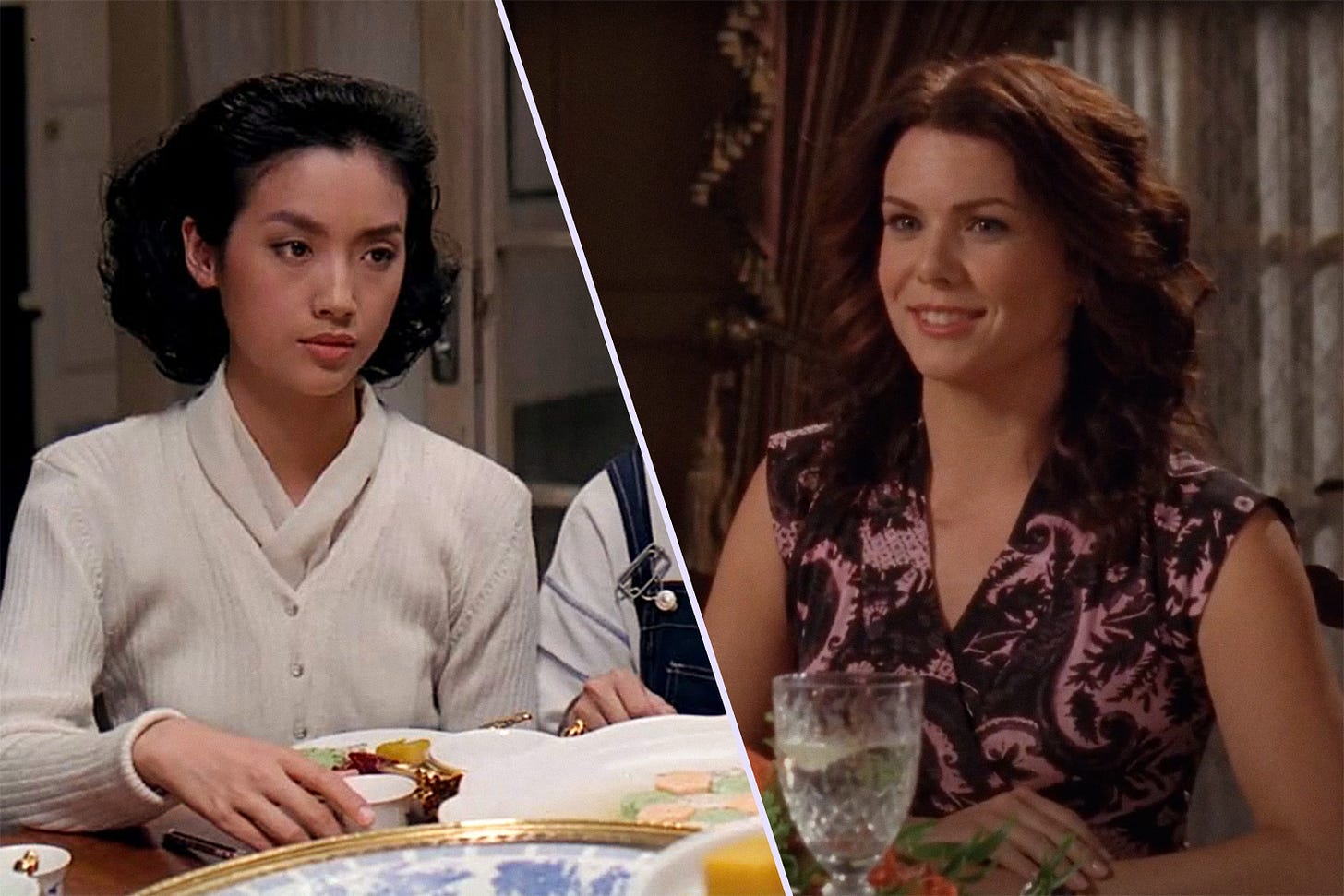
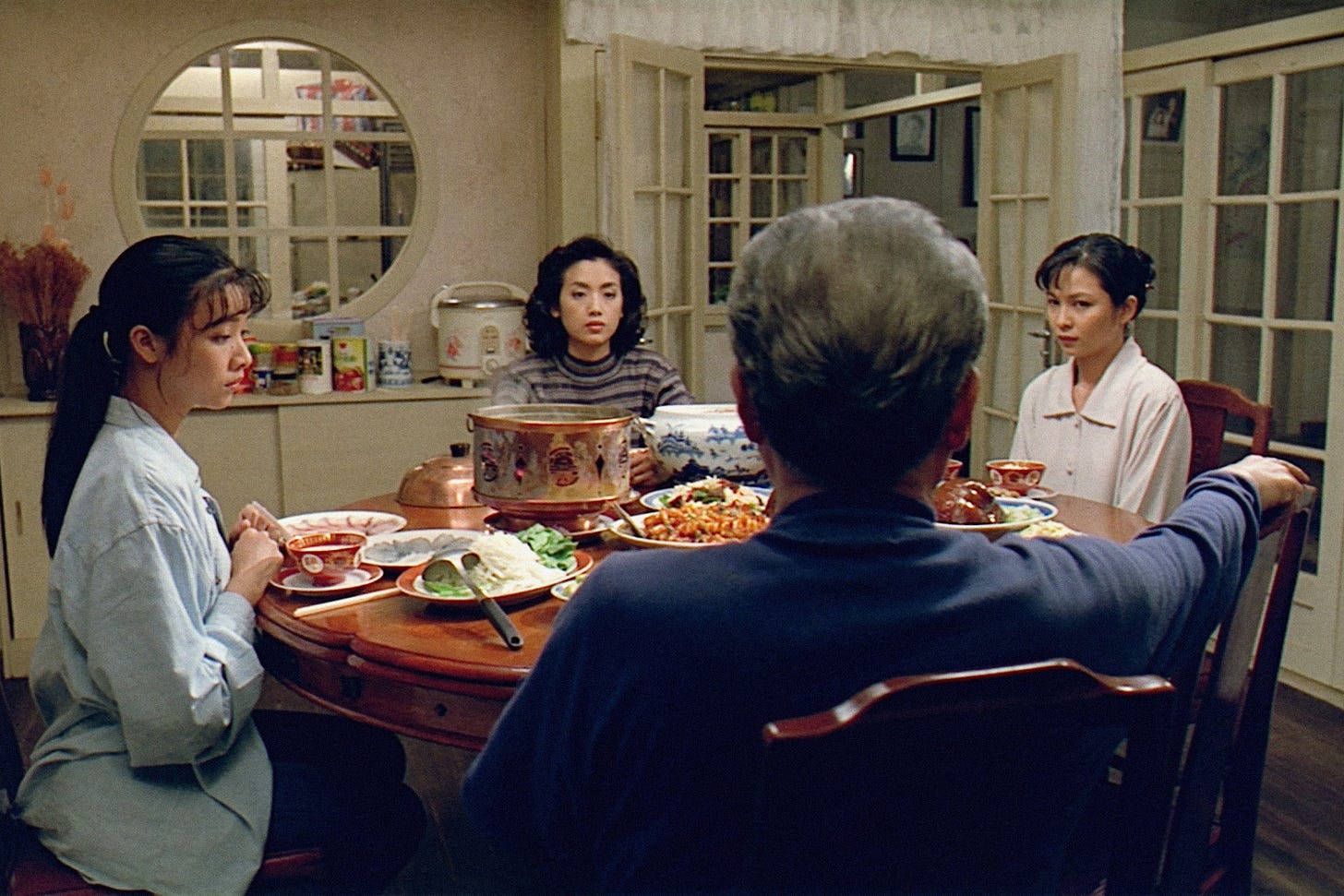
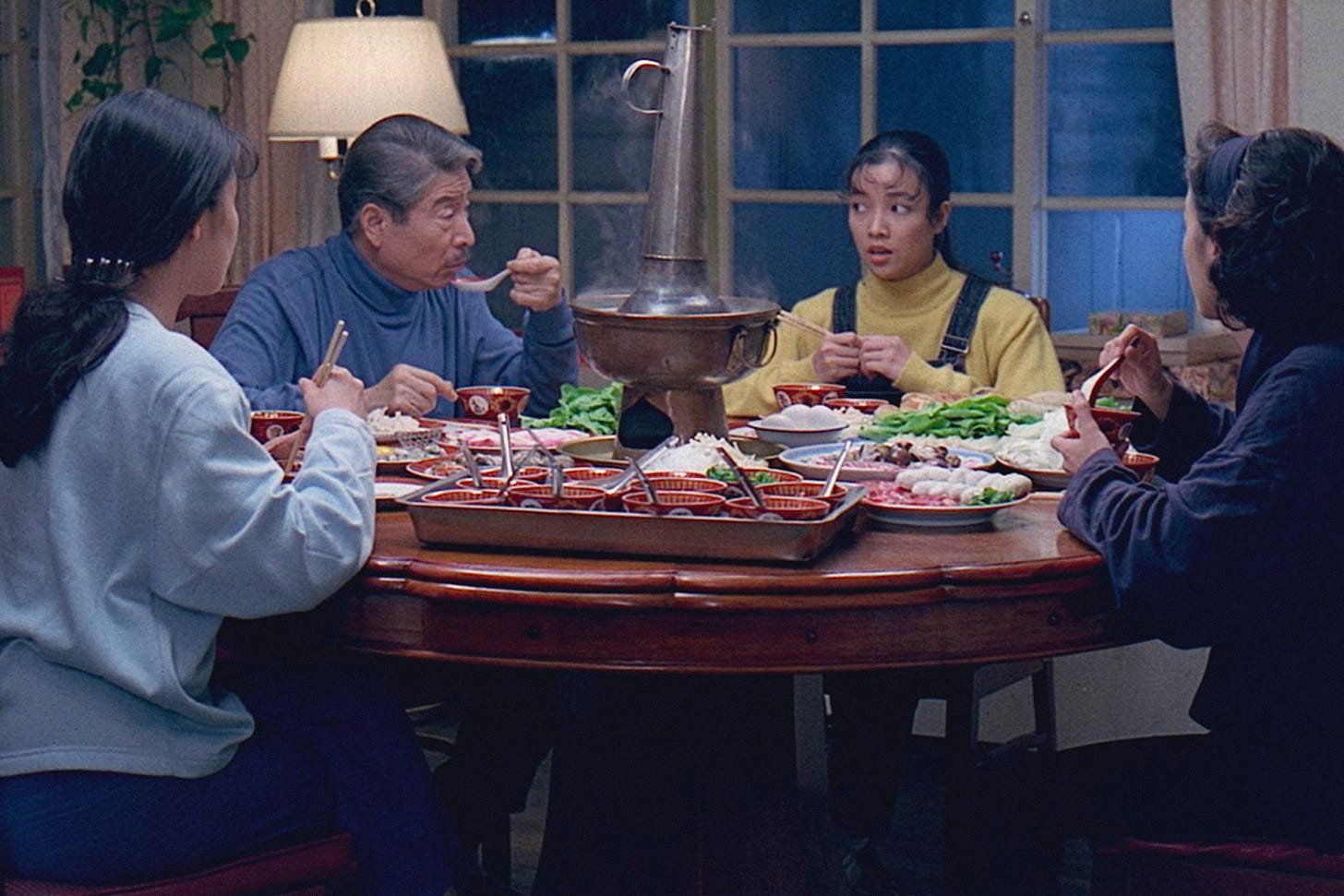
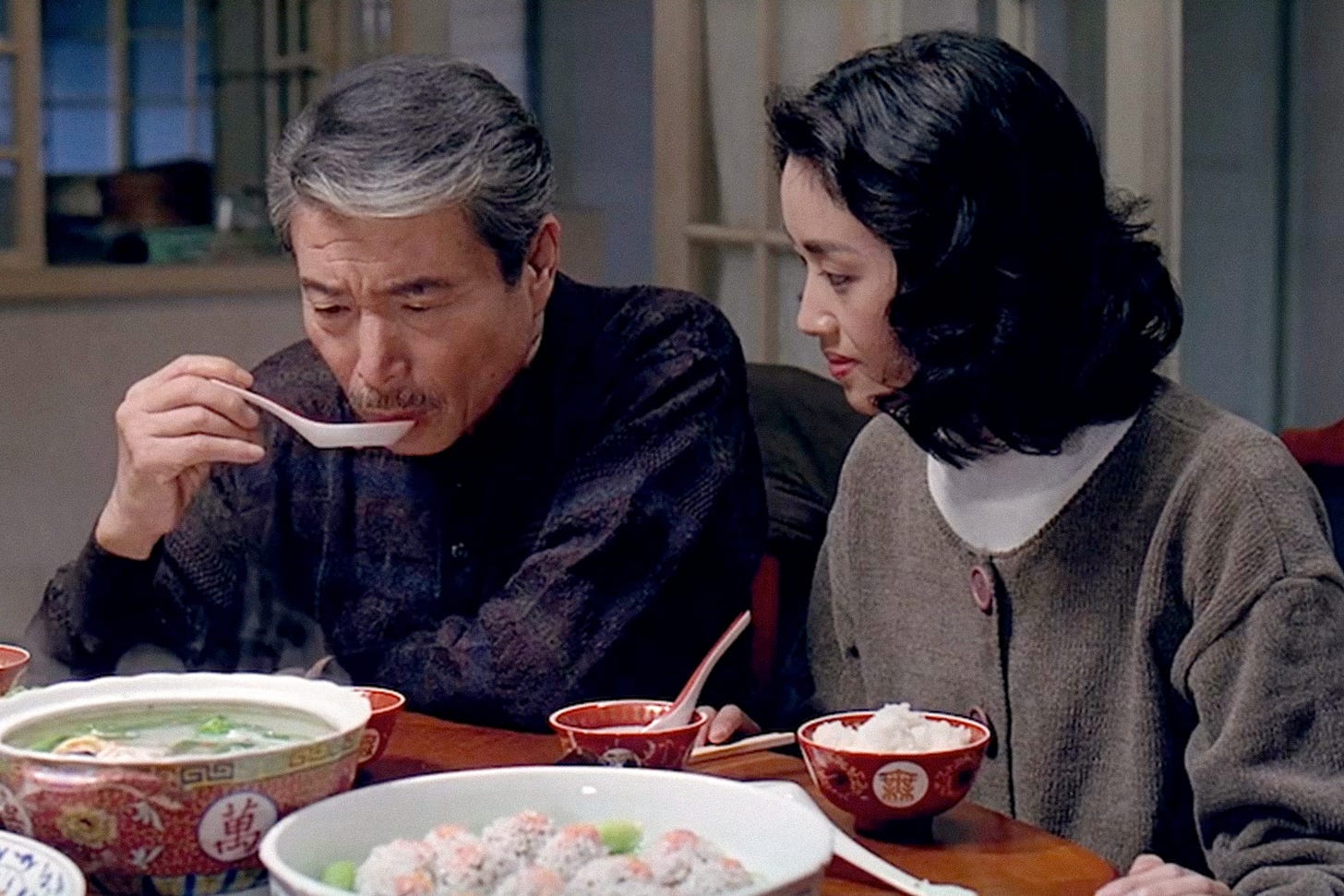
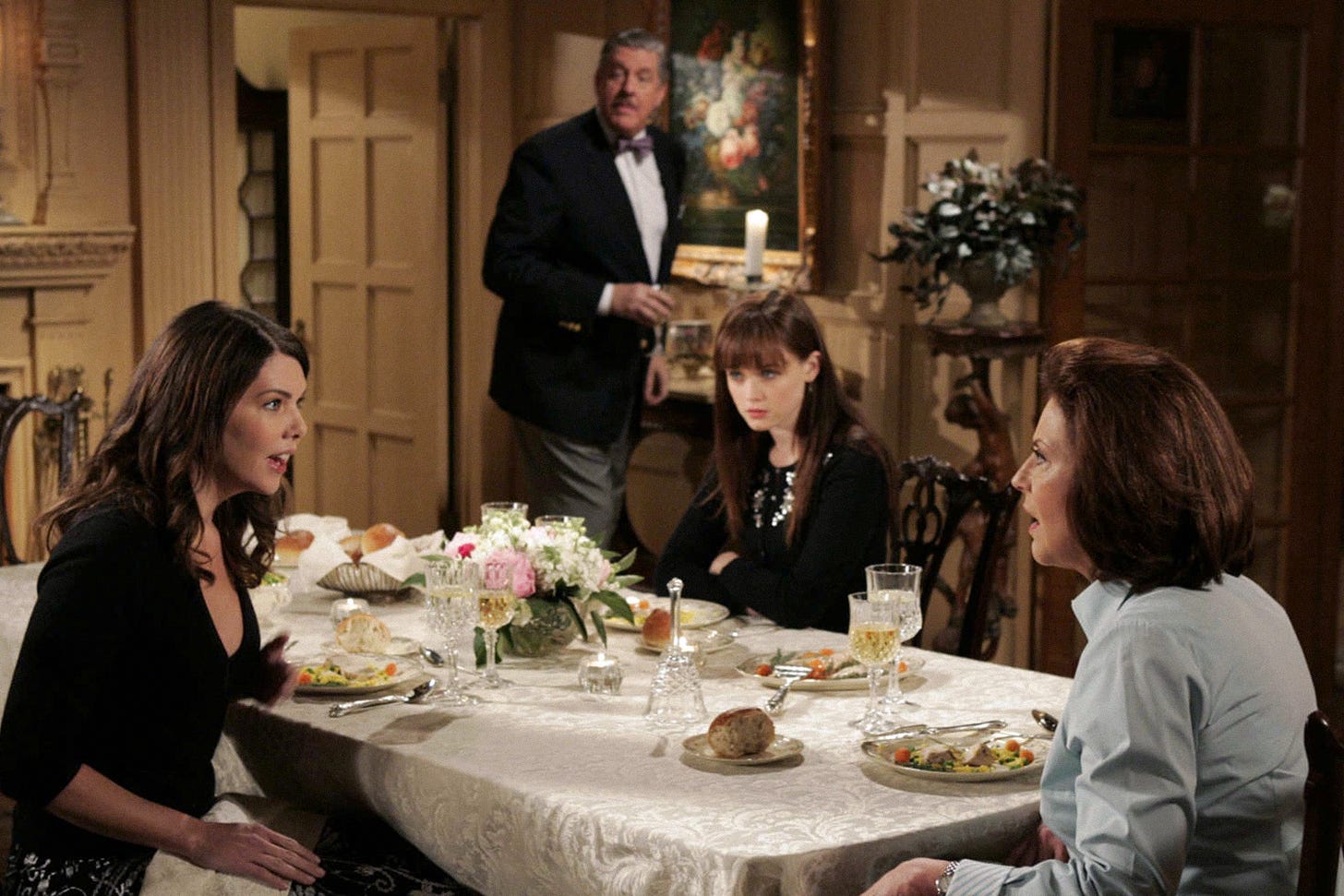
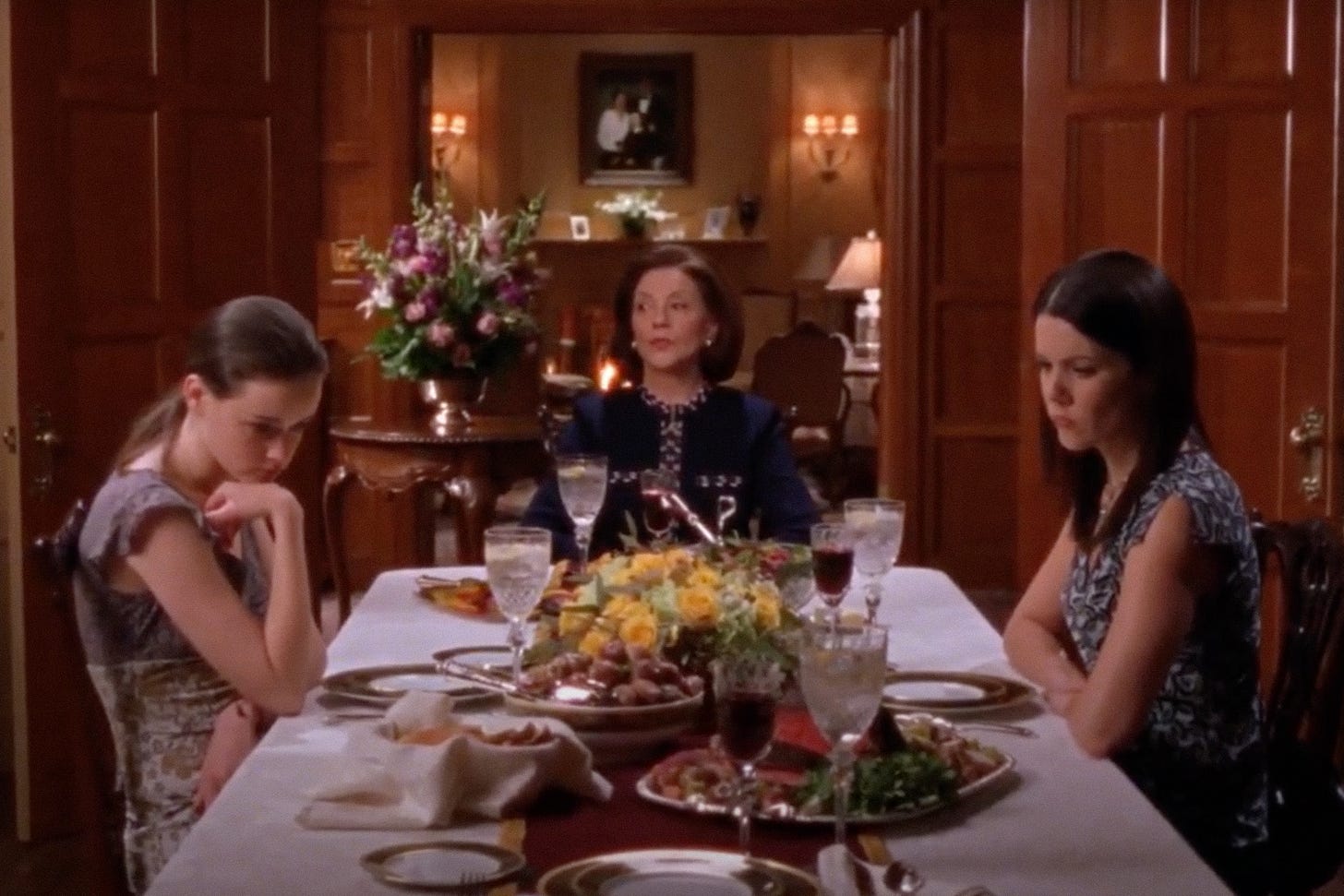
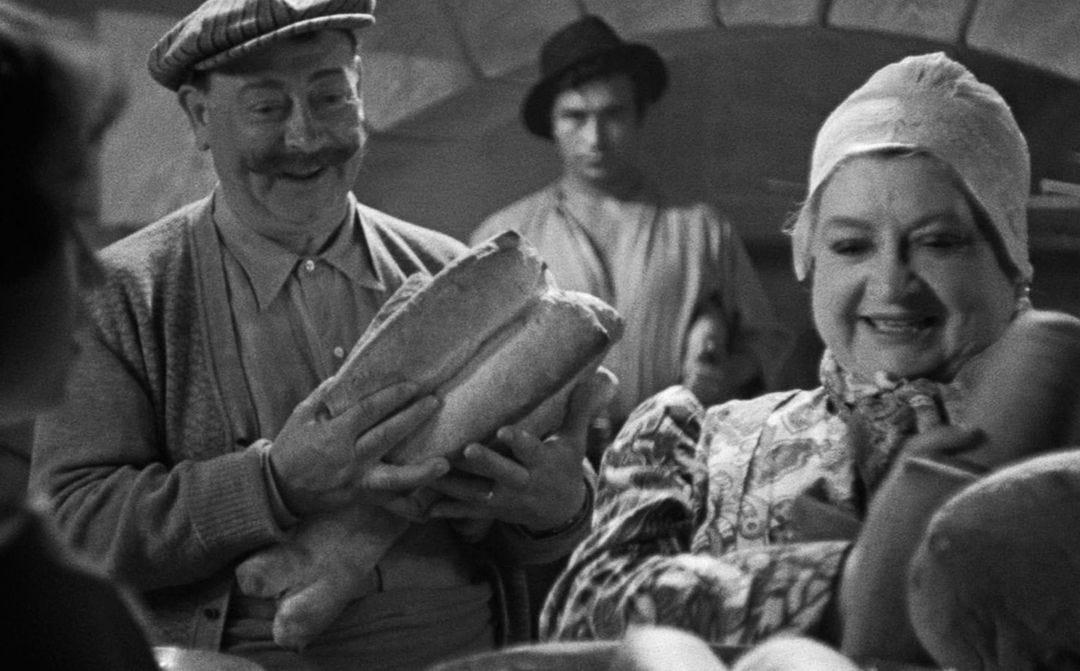


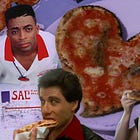
Haha what a great subject. Those Gilmore dinners...... yikes.
Those Friday night dinners can be ROUGH.